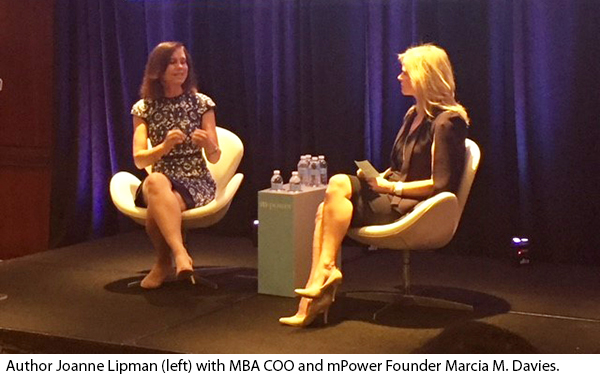
Closing the Gender Divide
NEW YORK–The rapid emergence of the #MeToo movement and heightened awareness of sexual harassment issues show how much things have changed. But too often in the workplace, a gender divide persists, with much work still ahead.
Joanne Lipman, author of That’s What She Said: What Men Need To Know (and Women Need to Tell Them) About Working Together, said closing the gender divide starts with inclusive dialogue.
 “The reason I wrote this book is because it addresses the issues that women talk about with each other, but haven’t been talking to men,” Lipman said here at an mPower event at Mortgage Bankers Association’s National Secondary Market Conference & Expo. “It’s a great conversation, but it’s only half of the conversation.”
“The reason I wrote this book is because it addresses the issues that women talk about with each other, but haven’t been talking to men,” Lipman said here at an mPower event at Mortgage Bankers Association’s National Secondary Market Conference & Expo. “It’s a great conversation, but it’s only half of the conversation.”
The vast majority of sexism issues in the workplace is not the blatant sexism, Lipman said, but from more subtle issues–unconscious bias. “Even the slightest unconscious bias can have an outsized effect on the workplace,” she said. “They are woven throughout the fabric of our lives in ways we don’t even realize.”
Google “CEO,” Lipman said, and most images will come up as men; Google “nurses” and the results are predominately women. “This shouldn’t be surprising, since Google is an algorithm written primarily by men,” she said.
Lipman said society values women less; thus, their contributions are valued less. “A woman must be two-and-a-half times more competent to be seen as equal to a man,” she said. “There is a ‘Respect Gap’ between the genders. A man will have more power and respect for the same position if the position was held by a woman.”
The disparity goes to feedback as well, Lipman said. Research shows that many men are afraid of providing “honest” feedback to female co-workers, for fear of upsetting them.
“Women who cry in the workplace don’t cry because they’re upset,” Lipman said. “They cry because their pissed.”
Workplaces can “un-bias” themselves, Lipman said. Some workplaces have instilled “No interruption” rules in which co-workers are not allowed to interrupt a co-worker during a meeting. Others have encouraged “amplification,” a method in which a co-worker repeats something that a co-worker said, to ensure that the idea has been heard and acknowledged.
“Leadership must ‘own’ workplace equality,” Lipman said. “Too many companies offload it to the HR department. The CEO and the COO and the CFO must recognize diversity as a workplace quality.”
“The #MeToo movement is not a ‘girl’ thing; it’s all of us,” Lipman added. “Together, we can change the world.”
This event marked the 20th mPower event since its inception. “mPower started in a very informal way,” said Marcia Davies, MBA COO and founder of mPower. “And it has grown into something bigger than we’d ever imagined.”
For more information about mPower (MBA Promoting Opportunities for Women to Extend their Reach) , click https://mba.org/get-involved/mpower.
